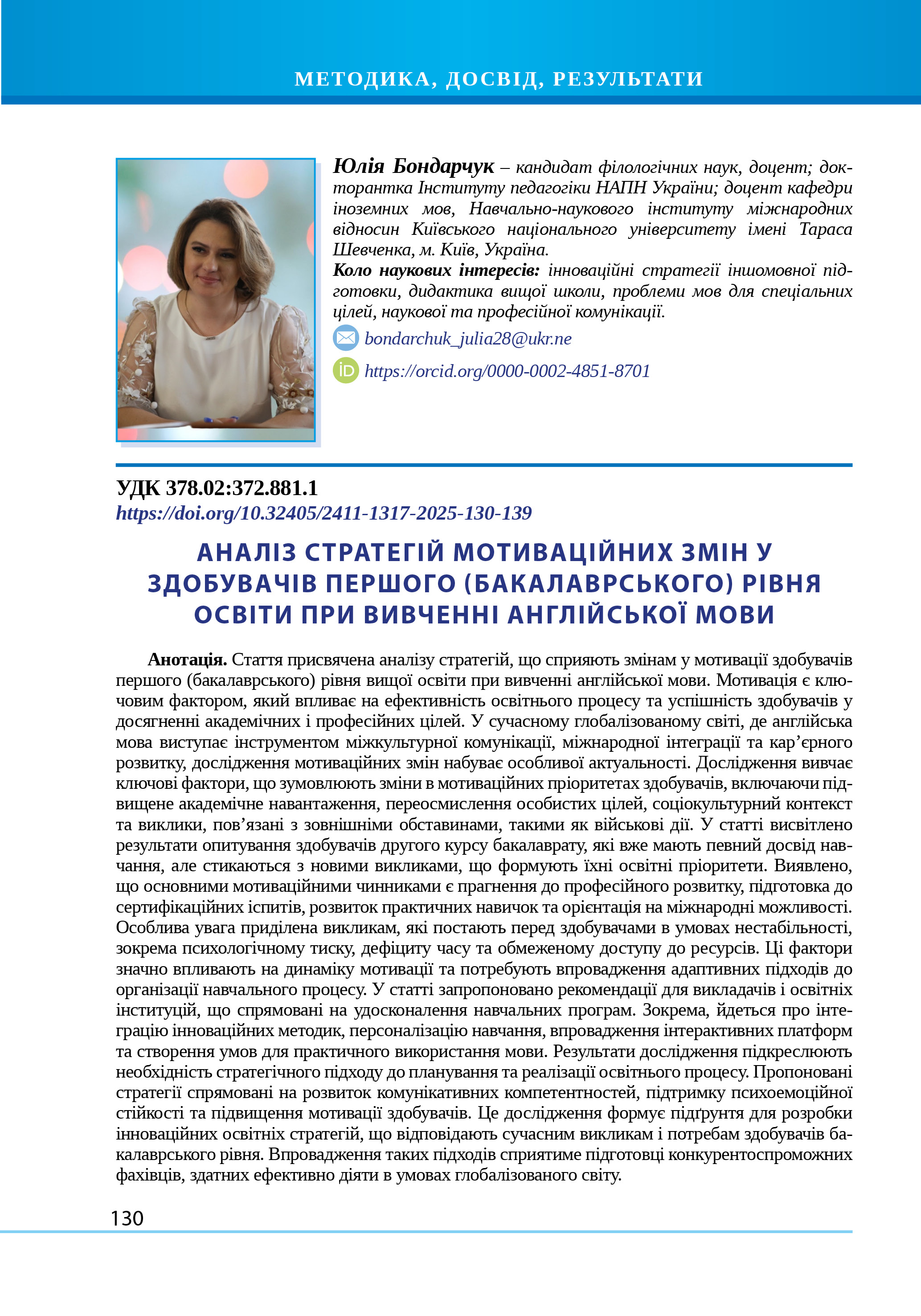Анотація
Стаття присвячена аналізу стратегій, що сприяють змінам у мотивації здобувачів першого (бакалаврського) рівня вищої освіти при вивченні англійської мови. Мотивація є ключовим фактором, який впливає на ефективність освітнього процесу та успішність здобувачів у досягненні академічних і професійних цілей. У сучасному глобалізованому світі, де англійська мова виступає інструментом міжкультурної комунікації, міжнародної інтеграції та кар’єрного розвитку, дослідження мотиваційних змін набуває особливої актуальності. Дослідження вивчає ключові фактори, що зумовлюють зміни в мотиваційних пріоритетах здобувачів, включаючи підвищене академічне навантаження, переосмислення особистих цілей, соціокультурний контекст та виклики, пов’язані з зовнішніми обставинами, такими як військові дії. У статті висвітлено результати опитування здобувачів другого курсу бакалаврату, які вже мають певний досвід навчання, але стикаються з новими викликами, що формують їхні освітні пріоритети. Виявлено, що основними мотиваційними чинниками є прагнення до професійного розвитку, підготовка до сертифікаційних іспитів, розвиток практичних навичок та орієнтація на міжнародні можливості. Особлива увага приділена викликам, які постають перед здобувачами в умовах нестабільності, зокрема психологічному тиску, дефіциту часу та обмеженому доступу до ресурсів. Ці фактори значно впливають на динаміку мотивації та потребують впровадження адаптивних підходів до організації навчального процесу. У статті запропоновано рекомендації для викладачів і освітніх інституцій, що спрямовані на удосконалення навчальних програм. Зокрема, йдеться про інтеграцію інноваційних методик, персоналізацію навчання, впровадження інтерактивних платформ та створення умов для практичного використання мови. Результати дослідження підкреслюють необхідність стратегічного підходу до планування та реалізації освітнього процесу. Пропоновані стратегії спрямовані на розвиток комунікативних компетентностей, підтримку психоемоційної стійкості та підвищення мотивації здобувачів. Це дослідження формує підґрунтя для розробки інноваційних освітніх стратегій, що відповідають сучасним викликам і потребам здобувачів бакалаврського рівня. Впровадження таких підходів сприятиме підготовці конкурентоспроможних фахівців, здатних ефективно діяти в умовах глобалізованого світу.
Посилання
Бондарчук, Ю. А. (2024). Інноваційні стратегії іншомовної підготовки студентів: аналіз мотиваційних чинників та ефективних підходів. Академічні студії. Серія «Педагогіка», 2, 3‒11. https://doi.org/10.52726/as.pedagogy/2024.2.1
Попов, Р. (2018). Інтеграція інноваційних і традиційних технологій навчання як засіб розвитку автономності студентів в освітній діяльності вищої школи. Український педагогічний журнал, 4, 54–59. https://doi.org/10.32405/2411-1317-2018-4-54-59
Семенишин, І. Є. (2011). Навчальні стратегії у вивченні англійської мови як методична проблема. Наукові записки. Серія: Педагогіка, 2, 153–157.
Топузов О. М., Малихін О. В., Арістова Н. О., Алєксєєва С. В., Попов Р. А., Барановська О. В., Шелестова Л. В. (2024) Теорія і практика індивідуалізації навчання в умовах змішаної форми організації освітнього процесу в закладах загальної середньої освіти: монографія. Київ: Освіта. https://doi.org/10.32405/978-966-983-485-0-2024-1099
Al-Athwary, A. A. H. (2022). Linguistic landscape in Najran: A sociolinguistic approach. Theory and Practice in Language Studies, 12 (12). https://doi.org/10.17507/tpls.1212.11
Bondarchuk, J., Khomenko, O., Vasylenko, O., & Yanchuk, O. (2024). Innovative strategies for learning English during wartime in Ukraine: Focusing on students’ motivation and preferences. Revista Romaneasca Pentru Educatie Multidimensionala, 16 (4), 378‒399. https://doi.org/10.18662/rrem/16.4/920
Bondarchuk, Ju. (2023). Norms and rules for developing a foreign language teaching strategy at institutions of higher education. Modern Science - Moderní Vĕda, 2, 82‒91. https://doi.org/10.62204/2336-498X-2023-2-11
Collen, I. (2020). Language Trends England 2020. British Council. https://pure.qub.ac.uk/en/publications/language-trends-england-2020
Council of Europe. (2001). Common European framework of reference for languages: Learning, teaching, assessment. Cambridge University Press.
Gunawan, J. D., & Tjitrakusuma, N. I. (2021). The politeness strategies found in @kulinersby’s Instagram account in promoting culinary businesses. K@ta, 23 (2). https://doi.org/10.9744/kata.23.2.58-68
Malykhin, O., Bondarchuk, J., Tersina, I., & Voitanik, I. (2024). Unlocking success: Strategic approaches to enhancing communicative competence in English learning. Amazonia Investiga, 13 (76), 90‒102. https://doi.org/10.34069/AI/2024.76.04.8
Malykhin O., Aristova N., Kalinina L., & Opaliuk T. (2021). Developing Soft Skills among Potential Employees: A Theoretical Review on Best International Practices. Postmodern Openings, 12 (2), 210–232. https://doi.org/10.18662/po/12.2/304
These are the Top 10 Job Skills of Tomorrow – and How Long it Takes to Learn Them. (2020). World Economic Forum. https://www.weforum.org/agenda/2020/10/top-10-work-skills-of-tomorrow-how-long-it-takes-to-learn-them/
Tsang, A. (2022). Examining the relationship between language and cross-cultural encounters: Avenues for promoting intercultural interaction. Journal of Multilingual and Multicultural Development, 43 (2). https://doi.org/10.1080/01434632.2020.1725526
Al-Athwary, A. A. H. (2022). Linguistic landscape in Najran: A sociolinguistic approach. Theory and Practice in Language Studies, 12 (12). https://doi.org/10.17507/tpls.1212.11 (in English).
Bondarchuk, J., Khomenko, O., Vasylenko, O., & Yanchuk, O. (2024). Innovative strategies for learning English during wartime in Ukraine: Focusing on students’ motivation and preferences. Revista Romaneasca Pentru Educatie Multidimensionala, 16 (4), 378‒399. https://doi.org/10.18662/rrem/16.4/920 (in English).
Bondarchuk, Ju. (2023). Norms and rules for developing a foreign language teaching strategy at institutions of higher education. Modern Science ‒ Moderní Vĕda, 2, 82-91. https://doi.org/10.62204/2336-498X-2023-2-11 (in English).
Bondarchuk, Yu. A. (2024). Innovatsiini stratehii inshomovnoi pidhotovky studentiv: analiz motyvatsiinykh chynnykiv ta efektyvnykh pidkhodiv. Akademichni studii. Seriia «Pedahohika», 2, 3‒11. https://doi.org/10.52726/as.pedagogy/2024.2.1 (in Ukrainian).
Collen, I. (2020). Language Trends England 2020. British Council. https://pure.qub.ac.uk/en/publications/language-trends-england-2020 (in English).
Council of Europe. (2001). Common European framework of reference for languages: Learning, teaching, assessment. Cambridge University Press. (in English).
Gunawan, J. D., & Tjitrakusuma, N. I. (2021). The politeness strategies found in @kulinersby’s Instagram account in promoting culinary businesses. K@ta, 23 (2). https://doi.org/10.9744/kata.23.2.58-68 (in English).
Malykhin O., Aristova N., Kalinina L., & Opaliuk T. (2021). Developing Soft Skills among Potential Employees: A Theoretical Review on Best International Practices. Postmodern Openings, 12 (2), 210–232. https://doi.org/10.18662/po/12.2/304 (in English).
Malykhin, O., Bondarchuk, J., Tersina, I., & Voitanik, I. (2024). Unlocking success: Strategic approaches to enhancing communicative competence in English learning. Amazonia Investiga, 13 (76), 90‒102. https://doi.org/10.34069/AI/2024.76.04.8 (in English).
Popov, R. (2018). Intehratsiia innovatsiinykh i tradytsiinykh tekhnolohii navchannia yak zasib rozvytku avtonomnosti studentiv v osvitnii diialnosti vyshchoi shkoly. Ukrainskyi pedahohichnyi zhurnal, 4, 54–59. https://doi.org/10.32405/2411-1317-2018-4-54-59 (in Ukrainian).
Semenyshyn, I. Ye. (2011). Navchalni stratehii u vyvchenni anhliiskoi movy yak metodychna problema. Naukovi zapysky. Seriia: Pedahohika, 2, 153–157. (in Ukrainian).
These are the Top 10 Job Skills of Tomorrow – and How Long it Takes to Learn Them. (2020). World Economic Forum. https://www.weforum.org/agenda/2020/10/top-10-work-skills-of-tomorrow-how-long-it-takes-to-learn-them/ (in English).
Topuzov, O. M., Malykhin, O. V., Aristova, N. O., Alekseeva, S. V., Popov, R. A., Baranovska, O. V., & Shelestova, L. V. (2024). Teoriia i praktyka indyvidualizatsii navchannia v umovakh zmishanoi formy orhanizatsii osvitnoho protsesu v zakladakh zahalnoi serednoi osvity. Kyiv: Osvita. https://doi.org/10.32405/978-966-983-485-0-2024-1099 (in Ukrainian).
Tsang, A. (2022). Examining the relationship between language and cross-cultural encounters: Avenues for promoting intercultural interaction. Journal of Multilingual and Multicultural Development, 43 (2). https://doi.org/10.1080/01434632.2020.1725526 (in English).

Ця робота ліцензується відповідно до Creative Commons Attribution-NonCommercial-ShareAlike 4.0 International License.


